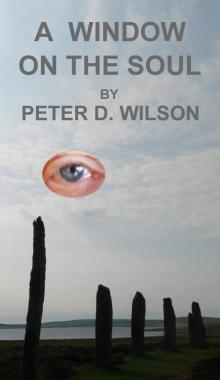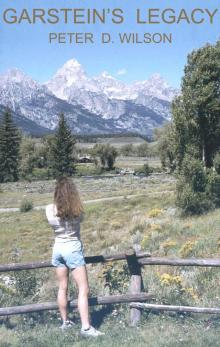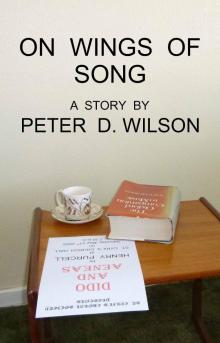- Home
- Peter D Wilson
A Window on the Soul Page 2
A Window on the Soul Read online
Page 2
effects look like becoming really distressing.”
“Could they?”
“I imagine that negative effects must be as likely as positive – we expect a kind of symmetry in that respect, though it’s really only an intuitive feeling – and it will be important to know about them, but we certainly don’t want them to get out of hand. It could be especially important to be careful in the third phase.”
“Third phase? What’s that?”
“We may not actually get so far – not for some time, anyway. The idea there, if things go well, is to set up a kind of feed-back loop – to use your brain patterns to control the changes to the image. That way we can test whether the connection is genuine or just fortuitous.”
“Just a moment; can’t feedback loops sometimes get out of control, like a microphone picking up sound from a loudspeaker?”
“A very good point. That’s called positive feedback. We might use that but only if you found the effect agreeable, and then with very great care. For unpleasant effects we’d use negative feedback, tending to nullify them. So it will be essential to describe the effects, if there are any, as fully as possible while they happen. But the whole idea is speculative; we shall need to evaluate the early results before we press on to anything like that. Ah, Jim ...”
An assistant had entered the room with a notebook and pen. “This is Jim Harrison, the technician who’ll be controlling the tests. I dare say you might have preferred a woman ...”
“Don’t worry, I’ve no objection at all to young men!”
“Good ... But in any case, with no disrespect to our other people, Jim is easily the best we have for this kind of job.”
“Spare my blushes, sir!”
“I didn’t know you had any!”
Jim grinned; he knew he had a reputation for cockiness and was honest enough to recognise some truth in it.
Norstein had to leave them for other tasks, but said he would come to see her when the day’s tests were completed. “Of course, it you’re utterly sick of them before they’re finished, by all means stop, but please pop in to see me before you go. If you’d just like a break, there’s a fairly decent library with a coffee machine, and not all the literature there is technical. We use quite a lot of fiction in our work.”
“Not in the reports, I hope?”
“Touché. There has been a certain amount of charlatanism in our profession, I must admit. But we aim for higher standards. Whether we actually achieve them ... Perhaps we’d better not go there. I’ll leave you in Jim’s hands for the time being.”
Jim set her up in the chair and adjusted the head restraints. He spent some time getting the cameras lined up exactly as he wanted them, and then proceeded as Norstein had described. At one point he adjusted the gain control on the voice recorder, prompting Sandra to ask if she was speaking too softly – “No, that’s fine, we can cope with whatever level you find comfortable.” After that everything went smoothly until Jim was satisfied that Phase One was complete and changed to a different programme. “Though it’s possible that we may come back to it if later results suggest that we’ve missed something.”
“Is that likely?”
“It quite often happens, particularly in a new field. It’d be surprising if we got everything right first time. To some extent we’re groping in the dark.” Sandra had a momentarily improper thought about groping in the dark with him, and was rather shocked to find it not entirely unwelcome. That reaction went unrecorded.
“Well, Mrs. Hardcastle ...”
“Sandra, please.”
“Well, Sandra, I’ve just noticed that it’s nearly lunch time so it probably isn’t worth starting Phase Two until this afternoon.”
“What do you do about lunch? I didn’t think to ask before.”
“There aren’t enough of us here to warrant having our own canteen, and some of us bring sandwiches, but there’s a fairly decent pub in the village if that suits you. The bar lunch menu’s not bad, and there’s a proper restaurant if you prefer that.”
“Same food at twice the price, I suppose.”
“Well, not quite, but would you like to see?”
“Fine, let’s do that.”
It was a clear day for once after a week of bad weather, and Sandra was quite glad of the half-mile walk to the village to loosen up after her long spell sitting. On arrival they were spotted by Norstein who invited them to join him in the bar lounge. “How’s it going, Jim?”
“All according to plan so far. Nothing particularly exciting, but it’s early yet.”
“Quite. Are you happy with it, Mrs. Hardcastle?”
“Well, I got a little stiff sitting there so long ...”
“Very uncomfortable?”
“Not really. Not enough to warrant going through all that setting-up again.”
“Ah, I’m glad you see the point. But if you do start to find it troubling you, do speak out. It could easily affect the results.”
“Er – Dr. Norstein ...”
“Yes, Jim?”
“You said we need a bit of stress to test whether the optical stimulus will ease it. Would that touch of discomfort do?”
“I was thinking more of mental than physical stress – but yes, a good idea, if Mrs. Hardcastle doesn’t mind.” She didn’t.
But then Norstein had another thought. “Tell me, Mrs. Hardcastle, have you ever had a particularly strong impression of having seen something that wasn’t actually there?”
“You mean hallucination? What on earth gave you that idea?”
“I’d rather not put a name to it just yet – there are some unpleasant overtones. And I’d better not say just now why it occurred to me in case it influences your response. But having something on your mind, and then thinking you could see it really present – perhaps only for a moment – have you ever had such an experience?”
“It’s funny you should mention that.” Sandra told how on one occasion she had been worried about a favourite cat that had disappeared, but on waking the next morning she had thought it was in her room, only it gradually faded from view.
“It wasn’t grinning, was it?” asked Jim. Norstein shot him a warning glance, but said nothing.
“No, nothing like the Cheshire cat in Alice. The image started quite realistically in colour – it was a ginger tabby – then gradually lost it and eventually vanished altogether like smoke. All that time it was behaving just as the real cat might. People said I must have been still asleep, but I don’t believe it – I was quite definitely out of bed before I saw it.”
“Are you suggesting that it was a ghost?” asked Jim facetiously.
This time Norstein did intervene. “Jim, don’t be flippant. It could affect results. Go on, Sandra.”
“Not at all. The real cat actually turned up after breakfast, accidentally shut in someone’s garage overnight I imagine. But is that the sort of thing you had in mind, Dr. Norstein?”
“Very much so. An unusual experience, I dare say, but not unique. Many years ago a fairly reputable journalist described something very similar, involving a complete railway train that he’d been expecting to board.”
“Just as well he didn’t actually get into it,” commented Jim, but Norstein thought that being unable to make physical contact would have promptly broken the illusion.
“It didn’t in my case,” said Sandra. “It wasn’t until I tried to stroke the cat, and put my hand right through it, that it even started to fade, and it must have taken five seconds at least after that. But why are you interested?”
Norstein explained that there was no accepted theory on the causes of such appearances, and ideas that had been suggested seemed to concern persistent tendencies rather than isolated experiences such as Sandra’s. They supposed a disturbance entirely within the brain, but he wondered whether there might be an external manifestation, for instance in the eye; the bleaching of visual pigments normally sent signals to the brain, but if impulses somehow went th
e wrong way, might there be a detectable effect in the retina? Neurologists dismissed the idea, but he wasn’t convinced. “I dare say they’re right as far as direct effects are concerned, but there may be indirect influences. And after all, the eye has been described as a window on the soul, and there might be more to the phrase than metaphor. Do you think, Jim, you could modify your set up so that your cameras might pick up any traces there?”
Jim, though privately believing that Norstein was off on one of his not infrequent wild goose chases, not to say his rocker, thought that it might be possible, given some fairly radical upgrades. Getting the necessary pieces of kit took time and to avoid wasting it, Phase Two proceeded under the former conditions.
Meanwhile the statisticians were trying to find correlations between the laboratory notes, the instrumental records and Sandra’s commentary, with nothing very convincing showing up. However, by chance the first session’s recordings were allowed to run on past the end of the actual test, and showed a flurry of brain activity with no spoken comment but a suggestion of facial colouring. “That couldn’t be a blush, could it?”
“It looks remarkably like it.”
“Was there any change in the conditions just then?”
“Jim’s notes end before that – I’ll ask if he remembers anything significant.”
All he could recall was the change of programme, and this started a false trail that ended only when a recognisably similar response followed one of the image changes of Phase Two. The analysts pounced on it and noted the

 A Window on the Soul
A Window on the Soul_preview.jpg) Towards Sunset (third edition)
Towards Sunset (third edition) Exit, pursued by a bear
Exit, pursued by a bear Pebbles from a Northern Shore
Pebbles from a Northern Shore Stage 12
Stage 12 Garstein's Legacy
Garstein's Legacy The Liar
The Liar On Wings of Song
On Wings of Song The Jester's Daughter
The Jester's Daughter Skiddlethorpe and other stories
Skiddlethorpe and other stories